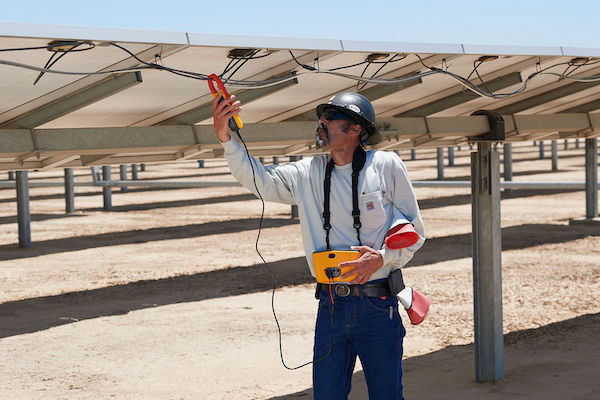5 Keys to Equipping Your Solar Installation Team
One of the fastest-growing industries in the world, the U.S. solar market is predicted to triple in the next five years – a great industry for technicians, project managers, and other professionals to enter and excel.
But to thrive in this booming field, solar teams need the right tools for success. As both new and veteran electricians enter the solar workforce, consideration of certain qualities when equipping yourself and your team can have a huge impact on your success. These five qualities are accuracy, durability, safety, user-friendliness, and multifunctionality.

When selecting the best tools to equip your rapidly growing solar installation team, ask yourself the following:
- Will these tools test and measure PV systems accurately the first time, every time?
PV projects depend on reliable testing and measurements. Inaccurate testing results lead to mistakes in proposals, quotes, and — ultimately — to inefficiencies in the array itself. Even if a mistake is caught in time, workers still have to redo measurements and testing. These errors also lead to project delays and unnecessary company expenses. However, if you’re confident in the accuracy of your tools, you’re able to complete jobs quickly, allowing you to move on to the next one, netting you more time and income.
When looking for solar tools, note any user review comments about their accuracy in measurement. In terms of where to look, companies with a long reputation of high-quality tools are a good place to start. Although the solar tool market is relatively new, many older companies have crafted accurate tools for several decades and carry that ethos over into their solar tools.
- Will these tools survive rooftop drops and severe weather?
One common complaint from solar workers is that their tools aren’t durable: they can’t withstand harsh environments, tumbles from heights (such as those that can occur on a rooftop PV project), or even just long-term use without hampered functionality. Last-minute replacement of non-functional tools leads to project delays and additional expenses.
The best tools withstand variable environments and drops from heights while maintaining accurate testing results. A durable tool that has a much longer lifespan than a cheaper one is worth a higher price tag, as it usually outlives a more fragile product. Look for tools that have been drop tested, and specifically designed for the weather and heights that solar technicians frequently find themselves facing.
- Will these tools keep my team safe on high-voltage projects?
The solar industry’s rapid growth has led to an abundance of enthusiastic new workers, many of whom may not yet have a high level of solar-specific training. These entry-level technicians often end up using tools they’re unfamiliar with, which is particularly dangerous in high-voltage environments like PV projects.
Check that the solar tools you’re considering are extensively field tested to ensure safety, so that your technicians can execute projects with peace of mind. As with all electrical projects, this includes selecting tools with the correct CAT rating and voltage levels for each PV project. Tools that are built to avoid dangerous consequences can be the difference between an “oops”, and a trip to the hospital.
- Will it be easy for the new solar technicians to learn how to use these tools?
A nice-to-have for all industries, user friendliness becomes a must-have in the solar industry. New technicians’ prevalence in the field requires tools with intuitive designs for swift onboarding that enables an equally efficient solar project.
This is easier said than done. Technicians who have newly joined the workforce, either from another industry or as entry level professionals, often find solar instruments and processes unfamiliar and more complex than they expected. This extra challenge can lead them to feel frustrated and make mistakes easily – especially because a PV project's environment often means that solar technicians work independently, and can’t always check in with a fellow worker to figure out a tool’s intricacies.
That’s why solar tools benefit from being designed for ease of use. Identify tools created with the solar technician in mind, to avoid having to learn how to use tools for purposes they weren’t specifically designed for. Simple differences like an intuitive interface, onscreen results, wireless connection, and internal memory can make a significant impact.
- How do I keep my team’s tool belts light for carrying across large solar projects?
One trait that improves onboarding, as well as project accuracy and efficiency, is carrying as few tools as possible! Instead of multiple tools that each do one thing, it’s much easier and more efficient to have one tool that does multiple things: for example, a single combined PV tester, performance analyzer, and I-V curve tracer. In addition, tools literally weigh down solar technicians – this becomes even more of an issue when working at heights. The fewer tools they have to carry in their case or belt, the safer they are.
Multifunctional tools also lead to quicker onboarding, since technicians don’t need as many training sessions. Multifunctionality enables easier and faster documentation, processes, and reporting. A tool that consolidates multiple functions improves accuracy, saves time, and makes the lives of both new and veteran technicians easier.

How to find the best solar tools for your team
Finding the right solar tools is easier when you prioritize reliable accuracy and durability, safety (even in high-voltage areas), user-friendliness for efficient onboarding and use, and multifunctionality to lighten the load (literally). To find these instruments, look for tools where the manufacturers consulted with solar professionals throughout design, testing, and production, to ensure that they can meet the real-world needs of solar installations, inspections, and maintenance. Be sure to consult fellow colleagues about their experiences with these tools – be it online or in person – and consider the trustworthiness of the manufacturers and their users.
Will White is a Solar Application Specialist at Fluke, which makes tools for industrial electronic installation, maintenance and service, and precision measurement and quality control.
Fluke | www.fluke.com
Author: Will White
Volume: 2023 March/April









.png?r=1284)


.jpg?r=2519)